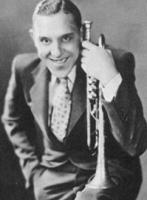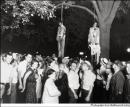[war sound effects]
Man, stop that war, them cats are killing themselves!
Put away the guns, put the bombs on a shelf
Stop this war the cats are killing themselves!
Boy, they're shootin' 'em up, and shootin' 'em line
They even got wings and they're shooting them fine
A big bomb hit a boat out in the sea
The sailors jumped up, hollered "Whatcha doin' to me?"
Boy they bring'em down lower than low
When the bomb hits the ground those cats have got to go
[bomb sound effect]
Boy, that sounds like one of those incendiary bombs
Where'd you get that word Wingie?
Boy, I dug it out of the dug out.
Man, stop that war, them cats are killing themselves!
Put away the guns, put the bombs on a shelf
Stop this war the cats are killing themselves!
Boy, they're shootin' 'em up, and shootin' 'em line
They even got wings and they're shooting them fine
A big bomb hit a boat out in the sea
The sailors jumped up, hollered "Whatcha doin' to me?"
Boy they bring'em down lower than low
When the bomb hits the ground those cats have got to go
[bomb sound effect]
Boy, that sounds like one of those incendiary bombs
Where'd you get that word Wingie?
Boy, I dug it out of the dug out.
Contributed by Bartleby - 2012/4/11 - 13:49
In 1941, when war knocked on America’s door at Pearl Harbor, the 15-year Swing Era was already eight years old. Music was the nation’s dominant cultural force; jazz orchestras ruled the pop charts and swing soloists were household names, as jazz critic Scott Yanow notes in The Illustrated Encyclopedia of Music. Swing was what all the hep cats danced to, if they could find space on the overcrowded floors of the Savoy or elsewhere.
When Japan attacked, composers quickly returned fire with a barrage of morale-boosting melodies, and pro-war jazz standards number in the dozens. As the first war fought in the electronic age (with nine in ten households owning a radio by 1940), Axis-smashing anthems like “G.I. Jive” and “V-Day Stomp” could be blasted to almost every home in the nation.
The Great War’s poets had penned plenty of verses condemning it, and songs like Alf Bryan’s “I Didn’t Raise My Boy to Be a Soldier” were written and popularly sung during that conflict. But, while that ditty was repurposed (as “It’s Time for Every Boy to Be a Soldier”) after the Lusitania was sunk, 1930s jazz was much more jingoistic from the off.
Soldiers and Swingsters, Brothers in Arms: Why was there no Anti-War Swing?The sole outlier seems to be Wingy Manone’s 1941 composition, titled “Stop The War (The Cats Are Killin’ Themselves).” Recorded nine months before Japan’s sneak attack on the States, this record opens with a cascade of falling bombs and bullet bursts, seeing ships blown up, planes brought down, and soldiers machine gunned.
“Put away the guns, put the bombs on the shelf,” the one-armed trumpeter urges, “stop the war, the cats are killin’ themselves.” With eerie prescience, he relates how “a big bomb hit a boat out in the sea” and “the sailors jumped up, hollered ‘whatcha doin’ to me?’”
But its apparent distaste for violence is unique, within swing. The comprehensive archive of anti-violence music at www.antiwarsongs.org has a section devoted to World War I, but none dedicated to its even bloodier sequel. Google “songs that won World War Two” and dozens of lists appear; search for swing songs protesting the conflict and the internet comes up blank.
Dr Sheldon Winkler, author of The Music of World War II, confirms that this is no computer glitch. “In all the lectures I have presented and the panels I have been a part of, I have never been asked about anti-war songs,” he said in response to my email. “I checked all of my books [on that era] and found nothing on anti-war sentiment.”
Soldiers and Swingsters, Brothers in Arms: Why was there no Anti-War Swing?
When Japan attacked, composers quickly returned fire with a barrage of morale-boosting melodies, and pro-war jazz standards number in the dozens. As the first war fought in the electronic age (with nine in ten households owning a radio by 1940), Axis-smashing anthems like “G.I. Jive” and “V-Day Stomp” could be blasted to almost every home in the nation.
The Great War’s poets had penned plenty of verses condemning it, and songs like Alf Bryan’s “I Didn’t Raise My Boy to Be a Soldier” were written and popularly sung during that conflict. But, while that ditty was repurposed (as “It’s Time for Every Boy to Be a Soldier”) after the Lusitania was sunk, 1930s jazz was much more jingoistic from the off.
Soldiers and Swingsters, Brothers in Arms: Why was there no Anti-War Swing?The sole outlier seems to be Wingy Manone’s 1941 composition, titled “Stop The War (The Cats Are Killin’ Themselves).” Recorded nine months before Japan’s sneak attack on the States, this record opens with a cascade of falling bombs and bullet bursts, seeing ships blown up, planes brought down, and soldiers machine gunned.
“Put away the guns, put the bombs on the shelf,” the one-armed trumpeter urges, “stop the war, the cats are killin’ themselves.” With eerie prescience, he relates how “a big bomb hit a boat out in the sea” and “the sailors jumped up, hollered ‘whatcha doin’ to me?’”
But its apparent distaste for violence is unique, within swing. The comprehensive archive of anti-violence music at www.antiwarsongs.org has a section devoted to World War I, but none dedicated to its even bloodier sequel. Google “songs that won World War Two” and dozens of lists appear; search for swing songs protesting the conflict and the internet comes up blank.
Dr Sheldon Winkler, author of The Music of World War II, confirms that this is no computer glitch. “In all the lectures I have presented and the panels I have been a part of, I have never been asked about anti-war songs,” he said in response to my email. “I checked all of my books [on that era] and found nothing on anti-war sentiment.”
Soldiers and Swingsters, Brothers in Arms: Why was there no Anti-War Swing?
AWS Staff - 2019/8/26 - 11:37
×
![]()
Note for non-Italian users: Sorry, though the interface of this website is translated into English, most commentaries and biographies are in Italian and/or in other languages like French, German, Spanish, Russian etc.





Scritta dallo stesso Wingy Manone
Testo trovato su WWII In American Music